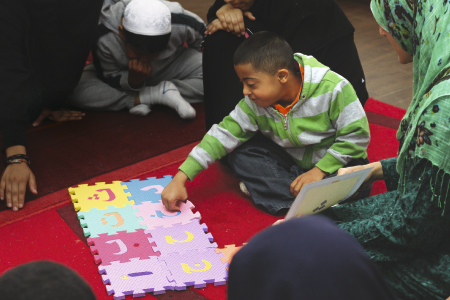
In the Shade of the Quran
Issue 81 June 2011
The global school of teaching children to read, recite and understand the Qur’an is the mainstay of Muslim culture. Suma Din asks if establishments teaching Quranic Arabic are inclusive enough for special needs children.
Zainab isn’t one to get frustrated easily. Yet today she is. This is her fourth attempt to find a suitable Qur’an teacher for her six year old son, Nabil who has developmentally delayed learning difficulties. Like the vast majority of Muslim parents, Zainab wants her son to learn to read and recite from the Qur’an, the first steps on the road to a lifelong relationship with the Divine message. But when teacher number four has, in spite of her best efforts, found the small group sessions she runs from home can’t cater for Nabil’s needs, what is Zainab supposed to do? Trying to find provision for children with learning difficulties in the Muslim community can be a fraught journey in the company of peer pressure and immense social stigma.
It is estimated that 15% of the world’s popular have ‘special needs’. In the UK alone, there are approximately 1.7 million children assessed as having ‘special educational needs’. These can vary from physical disabilities to the most common categories of autistic spectrum disorder (ASD) and speech and language difficulties. Most children with special educational needs (SEN) have their learning needs met in state run, mainstream schools. Some, with more complex needs, have a ‘Statement of SEN’ — this means they have been assessed by the Local Education Authority (LEA) and additional resources are required to meet their needs. Whilst official statistics for SEN do not include a ‘faith’ category, data related to ethnic minorities, consanguinity, poverty, and having English as an additional language, suggest Muslim children make up a sizeable group of UK’s children with learning difficulties.
Anecdotal research suggests Zainab is not alone. Fatima, whose six year old child is autistic, finds “there’s very little acceptance of special needs children in the community.”
“There’s a stigma attached to taking your child to community events in the mosque — some people even comment that you shouldn’t bring your child here. So, I’ve never considered taking them to a mosque to learn Arabic. I’m concerned about the group dynamics, how the other children, and their parents, would react and whether my child would get the support they need.”
While parents of children with special educational needs try to fulfill their child’s rights of learning to read and recite the Qur’an, what are educational institutions doing to offer the essential resources and some hope?
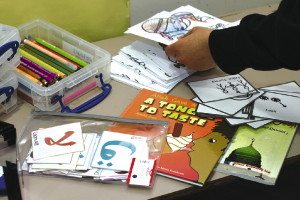
The Muslim Council of Britain is an umbrella body with over 500 affiliated national and regional mosques, charities and schools. The MCB’s education projects, mosque capacity building and leadership training courses have benefited the community nationally. However, regarding Qur’an classes in mosques, a member acknowledged the widespread problem of lack of awareness. “We haven’t put provision for children’s learning difficulties on the agenda yet because of other priorities in mosques, such as the basic infrastructure and policies that should be in place.” He did concede, however, that “we would like to see this subject raised and find ways to help these children.”
In contrast, Bolton Council of Mosques, umbrella body to the town’s 21 mosques, has put the needs of children on the map. Inayat Omarji, Operational Manager of the Council is rightly proud of their motto which states, ‘Every child matters in madrassah’. Their ‘Madrassah Governance Framework’ requires staff to be trained in child protection, safe-guarding, behaviour management as well as the mandatory CRB checks. In addition, they run the ‘Bolton Shared Care’ project to engage young Muslims with disabilities.
Inayat is realistic about the prevalent issues confronting them, “When it comes to the reality of running the mosque classes, the lack of manpower and financial resources means giving one to one attention to a child with learning difficulties is near impossible. All teachers are professionals who are well aware of specific needs, but simply can’t always address these needs due to the high number of other children in the class.”
Inayat finds that “parents who have a SEN child may shy away from sending them to a mosque class to learn Qur’an, but in my experience, as a committee member of one of the largest mosques in Bolton, we’ve never turned a child away from a mosque because of their learning difficulties. We do our best with the resources we have.”
Islamia Primary SchoolWith a career spanning 23 years in the UK’s first Muslim primary school, Najma Merchant is well placed to share practice for SEN children learning to read and recite the Qur’an at Islamia Primary School. In addition to being a Qur’an teacher, she is responsible for SEN and is the school’s Inclusion Coordinator. “The biggest challenge is that often, children with learning difficulties can lack motivation and concentration.” But with the right teaching methods, Najma has seen children with learning difficulties succeed in reading, reciting and loving the Qur’an. “They need the same provision as when we teach English phonics to SEN children. Things like large laminated letters, lots of oral and auditory work, breaking down targets and having realistic goals for them all help.” Najma’s voice emanates the genuine patience that she speaks about, “They need a lot of love and patience and lots and lots of praise!”
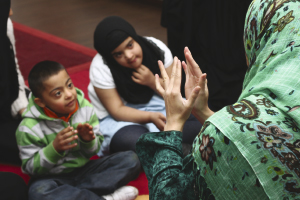
Established in 2000, Al Barakah in West London is a hugely popular supplementary school teaching Arabic, Qur’an and Islamic studies. 440 children aged between four and 18 years of age attend the weekend school, with 300 children on the waiting list.
Shamim Khan, Co-founder and Director, has witnessed the issues surrounding SEN first hand. “We put a question about learning difficulties on our application form, but many parents don’t inform us that their child has learning difficulties. Often our teachers discover learning difficulties, and then it can take years to get the parents to acknowledge there’s actually a problem. Some parents are cautious about their child being labelled in the community. When SEN is disclosed, it makes our job much easier as we have teacher training to support teachers with the best practise methods to meet these children’s’ needs.”
Claire Ali, currently a PGCE tutor in Modern Foreign Languages for the Open University has run several training sessions for Al Barakah teachers. She’s found that “when traditionally-run classes put children on the spot and under pressure to ‘read’ without ensuring that appropriate learning steps have taken place, whatever a child does pick up can be associated with fear and embedded in a negative way. That’s not a relationship we want to develop between a child and God’s beautiful message. Often, a child can be labelled as distracted or naughty when it’s simply that their specific SEN have not been met with appropriate learning activities. Teachers need to develop an awareness of the child’s preferred learning styles, and know how the child learns best.”
It’s the ‘how’ that Claire imparts in her training sessions, which are delivered as part of her newly launched company ‘Islam Educational Workshops’. Claire teaches tactile ways to make the Arabic letter shapes with a range of materials. “The brilliant thing about play dough, sand/rice tray writing and even mini whiteboards, is that the child’s attempt is not ‘final’ — they can amend it.” Encouraging the learners to talk about what the letters look like to them, finger painting and making letter collages provides wonderful visual clues for all learners, and are a few of the ways Claire advocates to meet SEN children’s needs. Ultimately, she finds what’s good for SEN learners is good for all the children, so Claire trains all staff to use VAK— visual, auditory and kinaesthetic activities to boost all pupils’ success in learning to read the Qur’an.
BaseeraInspired by a madrassah for blind children in South Africa, Elyas Ismail set about establishing Baseera in the UK, to initially provide education for the blind. He recalls that “after launching the charity in 2009, we were inundated with phone calls from parents who had children with learning difficulties or special needs. Hearing their desperate cries for help, we investigated a little further, trained some of our teachers in this field and now provide a service to people with disabilities and special needs.”
Baseera, in North London, is what parents up and down the UK are looking for. It runs classes in the weekdays and at weekends for children with a range of disabilities. The qualified staff teach children using multi-sensory resources, such as tactile, visual, or sound-based objects. They use activities such as finding the Arabic letter in the sand and recognising them verbally, or playing eye-spy with Arabic letters around the room to make learning active.
“The lessons are structured and divided into a timetable,” explains Elyas. “We also incorporate topic based Islamic studies in to the timetable with stories, recital and listening to surahs, action based nasheeds and remembering important duas. Our volunteers provide complete one on one attention for tabled activities.”
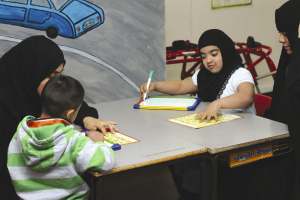
While many traditional madrassahs grapple with the concept of catering for special needs, Baseera goes one step further to charting progress. “Careful planning, monitoring, observations and assessments ensure that each child’s progress is evaluated and tracked so that the next steps in learning can be planned. We use a range of modern and traditional teaching methods in order to allow children with special needs to access the curriculum by using all of their senses when engaging with the Qur’an, so that the learning is a meaningful and purposeful experience.”
But Elyas is only too aware of the sensitivities surrounding a child being assessed for learning difficulties. He advises parents take the time to understand what their child’s statement or school assessment means. “The next step is to know that their child has the right to an Islamic education that must be suitable for their level of development, ability and understanding. Every single Muslim child has a right to an Islamic education and it should be possible to deliver this at their level of development and understanding.”
As a parent, Ayesha is delighted she’s found Baseera for her twin girls, aged eight, who are both autistic. “I don’t hide the fact that my girls are autistic, so I look for places that suit their needs. Baseera has the ideal pre-school setting, where activities are hands on and kept short. I never have a problem waking them up for Baseera on the weekend—they love going.”
Despite the countless commitment of these institutions in ensuring there are sufficient resources to accomodate for children with special needs, we must ask ourselves if enough is being done to assist those parents who want their children to be well equipped with the essential teachings of the Qur’an.
For further information about these organisations, visit:
www.baseera.co.uk
www.islameducationalworkshops.co.uk
www.thebcom.org
Bookmark this |
|
Add to DIGG |
|
Add to del.icio.us |
|
Stumble this |
|
Share on Facebook |
|
Share this |
|
Send to a Friend |
|
Link to this |
|
Printer Friendly |
|
Print in plain text |
|

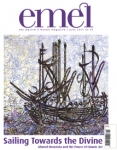
Comments
2 Comments
1
write my paper for me
20 Feb 17, 05:28
It is useful to present a short foreword to the opening end and
progress of Islamic guidance in China. From the Tang
government, the most important type of training for home
education through expressive means. Steadily began to get
spiritual instruction from outside instructor.
2
shahiram
27 Jun 11, 23:48
I am really proud of you all :) I pray Allah to make you steadfast on this for the sake of spreading His Religion and the genuine legacy of peace.